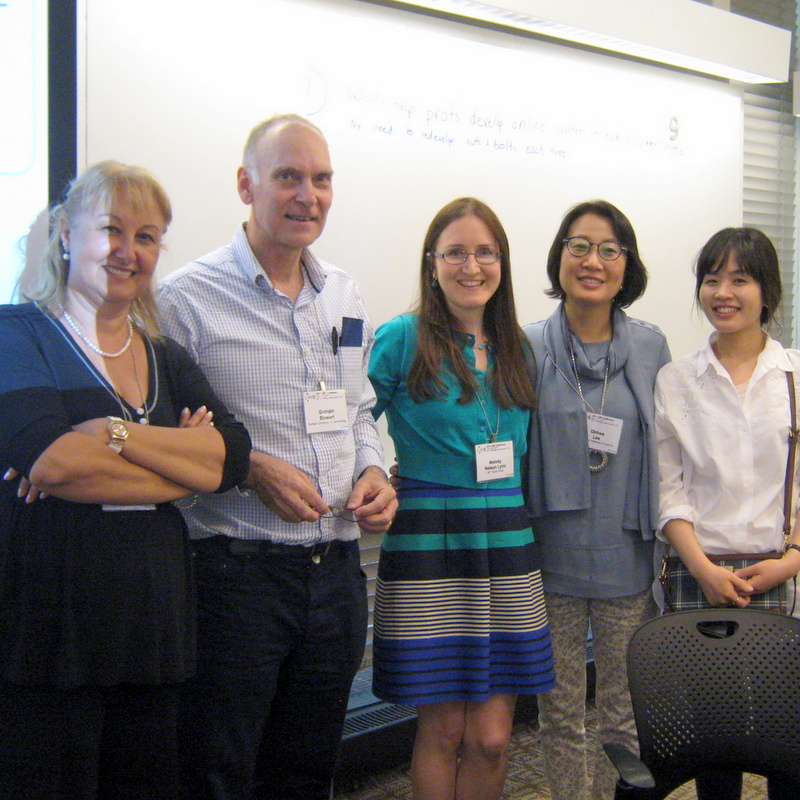 In June I participated in a workshop at MIT called “A Flipped Workshop: Hands-on MOOC Development”. Participants worked in teams of five and were given a “course packet” to develop their MOOC module. Our group were allocated the “Stanford Prison Experiment” – a chilling case study in research ethics abuse. Other groups worked on the course packets “Creative Commons” and “Economics”. Facilitators supported each team. Leading the workshop was Professor Isaac (Ike) Chuang, who has played a leading role in the development of the MIT-Harvard edX MOOCs initiative.
In June I participated in a workshop at MIT called “A Flipped Workshop: Hands-on MOOC Development”. Participants worked in teams of five and were given a “course packet” to develop their MOOC module. Our group were allocated the “Stanford Prison Experiment” – a chilling case study in research ethics abuse. Other groups worked on the course packets “Creative Commons” and “Economics”. Facilitators supported each team. Leading the workshop was Professor Isaac (Ike) Chuang, who has played a leading role in the development of the MIT-Harvard edX MOOCs initiative.
 Our group (see photo) comprised Dr Hayal Koksal (Turkey), myself, Prof Okhwa Lee (South Korea), Melody Nelson-Lyon (Canada) and Jules Seo (South Korea). The MIT TEAL laboratory (Technology Enhanced Active Learning) provides small group computer clusters in a circular table layout, each fitted with a conventional whiteboard, wall screen and a ceiling mounted video camera trained on the whiteboard area. Each setting is therefore a purpose-built flipped-classroom delivery system, allowing the participant to assemble pre-constructed elements of the virtual classroom, and seamlessly integrate these with live recordings of lecturer, demonstrating specific details of the lesson on the whiteboard. The lab is brightly-lit, comfortable and well-equipped, and located near the Vannevar Bush building and the Wright Brothers Wind Tunnel. There is a tangible sense that you are near one of the world’s most dynamic engineering and technology hotspots.
Our group (see photo) comprised Dr Hayal Koksal (Turkey), myself, Prof Okhwa Lee (South Korea), Melody Nelson-Lyon (Canada) and Jules Seo (South Korea). The MIT TEAL laboratory (Technology Enhanced Active Learning) provides small group computer clusters in a circular table layout, each fitted with a conventional whiteboard, wall screen and a ceiling mounted video camera trained on the whiteboard area. Each setting is therefore a purpose-built flipped-classroom delivery system, allowing the participant to assemble pre-constructed elements of the virtual classroom, and seamlessly integrate these with live recordings of lecturer, demonstrating specific details of the lesson on the whiteboard. The lab is brightly-lit, comfortable and well-equipped, and located near the Vannevar Bush building and the Wright Brothers Wind Tunnel. There is a tangible sense that you are near one of the world’s most dynamic engineering and technology hotspots.
On the way to the lab, I passed under a video announcement board suspended above MIT’s “infinite corridor” that proclaimed: “Are in-person lectures a thing of the past?” (see photo). The MOOCs that radiate from the edX platform are global experiments in testing that very question.



I’ve added two opposing views that have had me pondering on the ‘utopian’
view of MOOCs this whole week! Here are the two links:
the first: In the Developing World, MOOCs Start to Get Real
http://www.technologyreview.com/news/512256/in-the-developing-world-moocs-start-to-get-real/
and
MOOCs: Disrupting the University or Business as Usual?
http://arena.org.au/moocs-disrupting-the-university-or-business-as-usual/
Some resources to add to reading and thinking about flipped classrooms:
7 Things you should know about flipped classrooms – Educause – http://net.educause.edu/ir/library/pdf/eli7081.pdf
You can flip a lesson using YouTube videos – http://ed.ted.com/
A Step by Step Guide on Flipping your classroom with TedED – http://www.educatorstechnology.com/2013/05/a-step-by-step-tutorial-on-how-to-flip.html
Rosh
The notion off “flipped classrooms” can also lead to passive listening and learning, although it supports the students in terms of replaying the learning event, and catering for self-paced learning.
Flipping the “lessons”, using your own videos or those on Youtube (some created by experts) promotes the more active, participatory learning that engages the student and encourages critical thinking.
Taking this a step further to encourage deeper learning – ASK YOUR STUDENTS TO FLIP THE LESSON! And then see what they come up with. This encourages them not just to be consumers but producers of knowledge – all 21st century critical skills or graduate attributes.